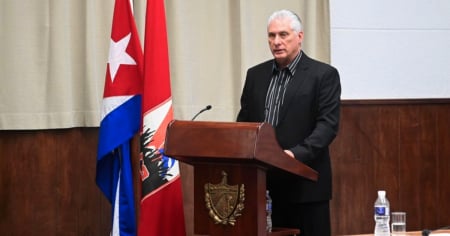During a recent work visit to the province of Holguín, Cuban leader Miguel Díaz-Canel held private small businesses responsible for the rise in prices, describing some of them as "abusive" and "torturous."
These statements come amid a deepening economic crisis characterized by inflation and a shortage of basic goods, where citizens are daily confronted with an increasingly precarious situation.
"Among the distortions in the economy, what stands out to me, according to the opinions expressed here, and was discussed, is the issue of prices. I see a stronger criticism regarding high prices. It's just that prices cannot be the same as they were 5 or 6 years ago," the leader stated in a report from Canal Caribe.
"But we cannot allow for abusive and extortionate prices," said Díaz-Canel, diverting attention towards small entrepreneurs while avoiding addressing the structural roots of the crisis.
The leader also criticized non-state forms of commerce, stating that "whenever a group of non-state vendors, who charge high prices, learns that there are inspections or enforcement actions, they retreat. That is the first sign that they are engaging in deceptive practices, and it needs to be addressed."
Although Díaz-Canel emphasizes the need to operate "within the law," his statements do not address the extreme conditions faced by small merchants, who operate in a market lacking basic supplies, with irregular offerings and wholesale prices that force them to set high margins to survive.
Instead of acknowledging the limitations imposed by the system itself, the government continues to use the private sector as a scapegoat.
At the end of his speech, Díaz-Canel announced that January will bring new visits to the province of Holguín, hinting at a future of increased oversight and control over entrepreneurs, which could further exacerbate the already fragile situation of the private sector in Cuba.
However, the government recently dealt another blow to the private sector. The Official Gazette of the Republic (Number 119) published Resolution 56 from the Minister of Domestic Trade, Betsy Díaz Velázquez, which automatically revoked the licenses for wholesale activities granted to micro, small, and medium-sized private enterprises as well as non-agricultural cooperatives.
This measure, which came into effect on December 5, was justified as an attempt to "regulate" wholesale and retail trade, but it represents another blow to entrepreneurs who are already facing enormous challenges in operating amid the economic crisis.
Additionally, last July, Díaz-Canel made the regime's stance on the private sector clear when he declared, "It's time to take action!"
With this statement, the ruler confirmed the shift of the Cuban regime in its politically cautious economic opening and reaffirmed his determination to subject the activities of the "new economic actors" to state guidelines and the centralized planning of the economy.
Frequently Asked Questions about Cuba's Economic Policies and the Private Sector
Why does Díaz-Canel blame small private businesses for the rising prices in Cuba?
Díaz-Canel blames small private businesses for the rise in prices, labeling some of them as "abusive" and "torturous." However, these remarks overlook the constraints imposed by the system itself, such as the scarcity of basic supplies and irregular distribution, which force merchants to set high margins in order to survive.
What measures has the Cuban government taken against Mipymes?
The Cuban government has implemented several measures, including the cancellation of wholesale licenses for small and medium-sized enterprises (Mipymes) and cooperatives, as well as the imposition of fines for violating established prices. Additionally, they have set price caps on certain basic products and revoked import licenses for some private companies.
What is the impact of government regulations on the Cuban private sector?
Government regulations, such as price caps and the revocation of licenses, have negatively impacted the private sector in Cuba, limiting its ability to operate efficiently. These measures can have adverse effects on economic growth, job creation, and social well-being.
How are Díaz-Canel's actions towards the private sector perceived?
Díaz-Canel's actions, such as oversight and control over private entrepreneurs, are seen as a repressive strategy that uses the private sector as a scapegoat for the economic crisis, while avoiding addressing the true structural roots of the problem.
Filed under:
